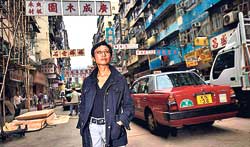
Belatedly, Asia's literary scene comes of ageHONG KONG: When Xu Xi's first novel was printed in 1994, she thought she had finally broken down the barricades of the publishing houses. She felt she had entered an inner circle where, even if the writing was still hard work, the rewards of being printed and read would flow a little more easily.
She soon discovered that being published in English by a small printing house in her hometown, Hong Kong, did not ensure the interest of the handful of companies based in the United States and Britain that dominate global English-language publishing. After that first novel, "Chinese Walls," set in the 1960s in a Hong Kong that was poor and crowded with raucous bars filled with GIs on leave from the Vietnam War, she went on to write five more. She even moved to New York in the hope that, somehow, proximity to international publishers might help open their doors. "Publishers in New York and London were encouraging," she said. "But they didn't basically know what to do with a Hong Kong writer." In October, that started to change. Xu's latest novel, "Habit of a Foreign Sky," made it onto the short list for Asia's first literary prize of real international standing. Her gritty tales of the lives of Hong Kongers, free of the stereotypes in many of the Western accounts of the former British colony, had long been hailed by scholars, dissected in creative writing classes and popular with Hong Kong and Chinese-American readers. But when she and four other authors were named as finalists for the Man Asian Literary Prize, international publishers suddenly took notice. The prize, which recognizes Asian novels unpublished in English, is to be awarded for the first time Saturday."Since I made the short list three publishers have called my agent - one from New York, one from London and one from Australia," she said. But her reaction was: "This is nice; isn't it about time?" Many writers of Asian fiction, who have struggled for years to be acknowledged outside small audiences in their own countries, would endorse that sentiment. But there are signs the Asian literary industry is starting to come of age, increasing the opportunities for many more Asian writers to gain international recognition. International publishers and literary agents say they are seeking many more works in Asia to bring to English-language audiences. They are also looking for new voices and genres that go beyond what publishers call "scar" or "misery" literature - about life in poverty under repressive regimes - and capture the rapid social and economic transformation of the new Asia. At the same time, they say Asia is building the infrastructure for a developed literary industry. They say it can be seen in the growth of international publishers opening regional offices to scout for talent and sell books in fast-growing English- and local-language markets; the emergence and greater importance of Asian literary festivals; and the numbers of Asian works being translated into Western languages. "Until recently, you would have been hard-pressed to identify what I call a literary industry in Asia," said Peter Gordon, the editor of The Asian Review of Books and a publisher based in Hong Kong. "But there are indications the industry has developed and now exists. There comes a moment where a number of distinct points gel into what you call an industry." The consequences will be an increasing volume of works of fiction coming out of Asia in the years ahead amid an expanding market within Asia for fiction in both English and local languages. Like the rest of the Asian story, China and India dominate the business calculus. The British publisher Penguin, which opened a China office in late 2005, has recorded sales growth of 200 percent a year, according to Jo Lusby, the general manager of Penguin China, based in Beijing. "It's a market we believe is underserved," Lusby said. "It's a very exciting market for us." Penguin has been selling English-language titles in China and translations of popular children's stories. But the majority of consumers of books in English are no longer expatriates, she said. They are now middle-class Chinese. At the end of this year, Penguin will also introduce its first Chinese translations of classic English literature under the Penguin logo in a deal with a state-owned publisher. It plans to bring out 30 new titles in this series a year. Gordon, who runs Chameleon, a small publisher, and an online book seller in Hong Kong, said the consumption of fiction was matching the "exponential growth" of Asia's economies. "When people have growing incomes, they start to buy CDs and they start to buy books," he said. "Increasing demand means people write more books and you have a virtuous cycle." |
|| Front
Page | News | Editorial | Columns | Sports | Plus | Financial
Times | International | Mirror | TV
Times | Funday
Times || |
| |
Reproduction of articles permitted when used without any alterations to contents and the source. |
© Copyright
2007 | Wijeya
Newspapers Ltd.Colombo. Sri Lanka. All Rights Reserved. |
